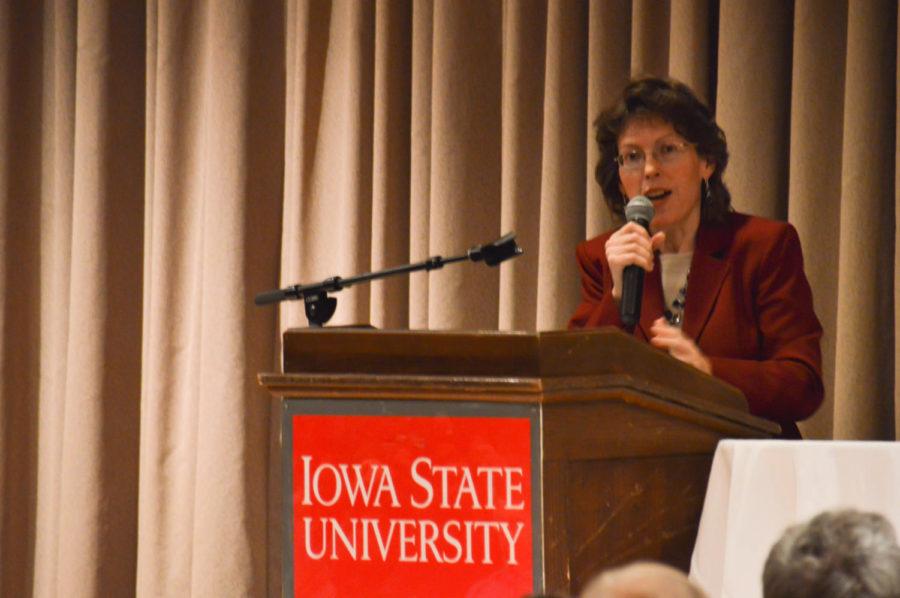A cautious question in a modern era: How to interpret the Bible?
Maddie Leopardo/Iowa State Daily
Mary Healy, professor of sacred scripture at Sacred Heart Major Seminary, gives a lecture titled “How to Interpret the Bible,” on March 30 in the Memorial Union Sun Room. Healy, who completed her doctorate in biblical theology at the Pontifical Gregorian University in Rome, shared her perspective to the audience.
March 30, 2017
In the last half century there has been a loss of religious literacy that has progressed in the modern era, raising the question — how does one interpret the Bible?
That is the question Mary Healy, professor of sacred scripture at Sacred Heart Major Seminary in Detroit and senior fellow at the St. Paul Center for Biblical Theology, posed Thursday evening to a crowd of about 300 in the Memorial Union.
The main questions covered in the lecture revolved around whether the Bible should be interpreted in a literal or in a spiritual way, and what can be done to handle contradictions and historical inaccuracies.
It is important, she believes, to ask these kinds of questions because there is a vast variety of approaches to interpreting the Bible today.
That variety can leave people confused on where to begin or may leave people with the impression that they can’t interpret the Bible unless they are an expert.
“I hope in this lecture to wet peoples’ appetites for reading the Bible and help people realize that the Bible is God’s word and [is] for everybody,” Healy said.
Healy mentioned in her lecture that the loss of biblical literacy is the loss of the narrative that gives the history of creation and to an extent, the narrative that gives one a meaning to life.
She believes it is important to not lose the word of God, speaking on behalf of the perspective of a Christian believer.
“The question, ‘How to interpret the Bible?’ is not a merely theoretical question, it’s a question that has profound existential importance for all those who believe in God, in Jesus and the word of God,” Healy said.
Healy explained that, even in the past, it was recognized that there was figurative language used in the text of the Bible, and that language was to be interpreted.
This was, in a sense, the literal interpretation of the Biblical writings. The other sense of interpretation that was recognized was the spiritual sense.
“The spiritual sense is the traditional term for the way a person or a thing or an event, at an earlier stage of God’s plan, points forward to and foreshadows the fulfillment of his plan,” Healy said. “The spiritual sense is the way Christ is hidden so to speak.”
A vital aspect of literally interpreting the Bible is to properly detect the genre of literature the biblical passages are written in. Healy explained that misinterpretations occur when mistakes are made in determining which genre the passage was written in.
There can be fundamental misunderstandings of the true meaning of certain passages if they aren’t interpreted in the correct context. As for the spiritual interpretation, Healy gave the explanation that God writes with events.
“God actually uses events to signify future events,” Healy said.
Anne Clifford, associate professor of philosophy and religious studies, asked a question during the Q&A portion of the lecture regarding whether or not there is still a place for historical interpretation along with the literal.
She holds the opinion that the historical interpretation is important because it is important for one to put themselves in the place and time that an event took place in order to understand it better.
Healy said a union of the two interpretations would complement one another in developing an optimal perspective of the Bible.






